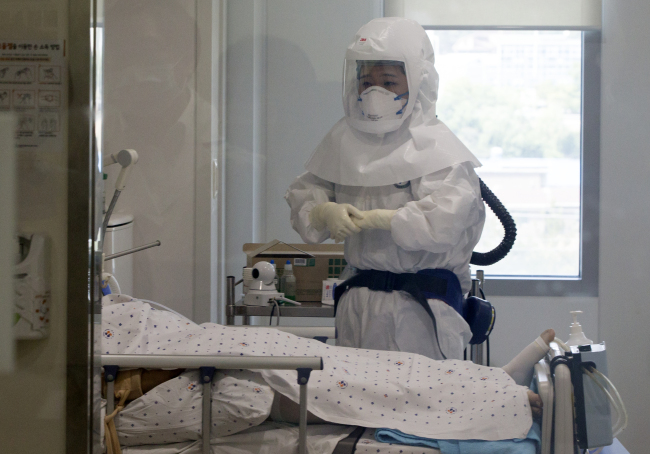Thirteen more cases and two more deaths of Middle East respiratory syndrome were confirmed Wednesday, bringing the total number of infected to 108 and the death toll to nine, as South Koreans hung on to hopes that the virus would start abating this week.
The deceased ― a 62-year-old man and a 75-year-old woman ― had been receiving treatment at an intensive care unit when their conditions worsened, according to the Health Ministry’s MERS special response team. The former had a history of liver cancer and liver cirrhosis while the latter had been suffering from multiple myeloma.
MERS is thought to particularly affect those with preexisting medical conditions. All MERS-related deaths in Korea to date have been patients aged over 55.
Of the 13 new infections, 10 were at Samsung Medical Center in southern Seoul, now one of the nation’s two hardest hit medical facilities in the MERS outbreak. As of Wednesday, 29 hospitals were affected by the disease.
The deceased ― a 62-year-old man and a 75-year-old woman ― had been receiving treatment at an intensive care unit when their conditions worsened, according to the Health Ministry’s MERS special response team. The former had a history of liver cancer and liver cirrhosis while the latter had been suffering from multiple myeloma.
MERS is thought to particularly affect those with preexisting medical conditions. All MERS-related deaths in Korea to date have been patients aged over 55.
Of the 13 new infections, 10 were at Samsung Medical Center in southern Seoul, now one of the nation’s two hardest hit medical facilities in the MERS outbreak. As of Wednesday, 29 hospitals were affected by the disease.

As of Wednesday afternoon, the number of people quarantined for possible infection rose to 3,439. Another 229 are waiting on their test results, including a pregnant woman who was initially reported to be the nation’s first pregnant MERS patient, but tested negative in the second test.
According to authorities, 11 patients are in unstable condition, including a doctor from Samsung Medical Center who requires breathing assistance.
Four people have fully recovered from the disease, including a 25-year-old woman who was released from the hospital Wednesday.
In a public statement, acting Prime Minister Choi Kyung-hwan said the government has designated medical institutions in each municipality for intensive treatment of MERS. The 16 institutions include Boramae medical center in Seoul, Chungnam National University Hospital in Daejeon and Seoul National University Bundang Hospital in Bundang, Gyeonggi Province.
The government also designated 32 separate hospitals to treat suspected MERS patients.
Choi advised people to refrain from visiting hospitals, as all infections to date have occurred at hospitals.
Health authorities reiterated that the possibility of an epidemic was slim, saying that confirmed patients have not come into contact with the general public. But with many in the public questioning the effectiveness of government measures and the number of cases climbing, the MERS scare showed little signs of slowing down.
To date, 1,547 educational institutes in Korea have canceled classes. The Seoul education office extended the cancellation of classes for the MERS-stricken Gangnam-gu and Seocho-gu regions and strongly advised schools in Gangdong-gu and Songpa-gu to suspend classes as well.
Speculations by the health authorities also turned slightly grimmer Wednesday.
The MERS special response team Tuesday had speculated that the outbreak would start to gradually decrease. But in Wednesday’s briefing, it said more cases may emerge for the next two or three days.
As part of its effort to rein in MERS, the government turned to more drastic measures. It conducted an inspection on all patients diagnosed with pneumonia in over 3,000 medical institutions across the country, as part of the “preemptive” measures against MERS.
Patients subject to inspection were banned from leaving the hospitals.
The wide-scale inspection was in response to calls made by the Korea Society of Infectious Diseases, which suspected that MERS patients being wrongly diagnosed with pneumonia had led to the disease’s rapid spread.
As MERS symptoms are similar to those of pneumonia, many patients were initially labeled as pneumonia patients and not quarantined, including the nation’s first MERS patient. This appears to have subsequently led to the large-scale infection within the hospital.
A joint team of officials from the government and the World Health Organization were conducting an investigation to determine the reason for the infection’s rapid spread in such a short time. The first patient was diagnosed on May 20.
“The evidence presented thus far suggests that the pattern of the outbreak in the Republic of Korea may be similar to MERS outbreaks that have taken place in health care facilities in the Middle East. However, the situation is rapidly evolving and investigations are ongoing,” the joint team said in its message to the Korean public.
Margaret Chan, director-general of the WHO, suspected that South Korea’s culture of taking care of family members’ illnesses may have contributed to the rapid spreading of the disease.
But the joint team advised authorities to reopen schools, as they are not linked to the transmission of MERS.
The government’s concern is now on preventing massive infections from reoccurring after Samsung Medical Center and Pyeongtaek St. Mary’s Hospital each reported 37 cases.
“As of now, all MERS infections occurred via close contact. We are closely monitoring to ensure that we do not lose track of anyone who has had close contact with a MERS patient,” said Kwon Deok-cheol from the MERS special response team.
South Korea is second only to Saudi Arabia ― where the illness was first reported in 2012 and which hosts over 90 percent of total confirmed cases ― in the number of MERS cases. As such, other countries have stepped up monitoring tourists from Korea.
Hong Kong’s health authorities reported Wednesday that 16 tourists from Korea have been quarantined and tested for MERS since Monday.
By Yoon Min-sik (minsikyoon@heraldcorp.com)







![[Hello India] Hyundai Motor vows to boost 'clean mobility' in India](http://res.heraldm.com/phpwas/restmb_idxmake.php?idx=644&simg=/content/image/2024/04/25/20240425050672_0.jpg&u=)










